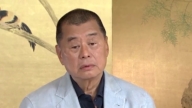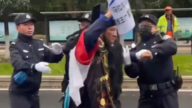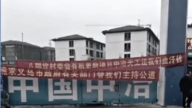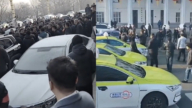【新唐人2014年04月24日訊】5萬名工人罷工持續兩週之後,號稱全球最大的品牌鞋類生產商——廣東東莞裕元鞋廠,最後不得不做出讓步,增加工人的福利待遇。據統計,今年年初以來,中國國內出現罷工次數比去年同期多出三分之一。中國工人開始懂得維護自己的權利,和提出正當訴求了嗎﹖請看報導。
「裕元鞋廠」作為世界名牌運動鞋的代工基地,在中國擁有多個廠區。「裕元」所屬的台灣「寶成集團」,在中國的工人超過16萬,是全球60多個品牌的代工廠,約佔全球運動鞋及休閒鞋市場20%的份額。
但「裕元」在員工的社保金繳納上卻違反規定,只按「臨時工」標準給正式員工繳納社保金,或者乾脆逃避企業應該繳納的部分。
2007年,此事曾被《央視焦點訪談》節目曝光。
但十年來,「裕元」依然不改。
今年4月5號,工人停工堵路,要求工廠補繳社保基金。「裕元」廠方聲稱將在14號給出答覆。但14號廠方再次迴避問題。
當天,憤怒的工人拉起橫幅,有超過5萬名工人走上街頭。工人與警方還發生了衝突,有工人受傷。
隨著罷工事件的持續,「寶成集團」最後做出讓步,並在21號宣佈,自5月1號起,將社保及住房公積金足額繳納,一次到位,並同意根據員工個人意願,補繳養老保險及住房公積金。
「寶成」同時也宣佈,自5月起,東莞廠區每人每月加發人民幣230元生活津貼。
紐約「中國勞工觀察」創辦人李強:「東莞裕元鞋廠,它解決這個糾紛的時候,主要是它資方董事會做一個決定,實際上根本沒有充分徵求工人的意見。雖然它在21號出臺了一些政策,比如對經濟上的一些讓步。但是從尊重工人來講,我覺得還是沒有做夠的。」
總部設在紐約的「中國勞工觀察」組織創辦人李強表示,在中國沒有尊重工人的企業文化,如果工廠有一個通過民主選舉的工會幫工人維權,情況就不一樣了。但中國缺少這樣的制度,沒有給勞資雙方提供溝通平臺。
像「裕元鞋業」這種因待遇問題發生的罷工,並不是個案:
今年3月6號,美國國際商用機器公司「IBM」深圳工廠,一千多名員工罷工﹔3月24號,上海市嘉定區的日本獨資企業「上海內野有限公司」,700多名工人罷工﹔4月10號,上海「三星廣電電子器件有限公司」一千多工人罷工;21號北京市「電機總廠」上千名員工罷工﹔美國的跨國零售企業「沃爾瑪」也正在與工會進行談判。
設在香港的《中國勞工通訊》統計,3月份發生了119起罷工事件。《中國勞工通訊》指出,在中國,今年罷工事件的總數增多了近三分之一,創下自全球金融危機以來的最大增幅。
《中國勞工通訊》的發言人郭展睿認為,中國工人開始懂得自己維權了,也敢於對老闆說「不」了。
香港《中國勞工通訊》發言人郭展睿:「他們現在有辦法,他們有自己的權利,他們都知道他們的權力在哪裏:他們可以罷工、抗議這樣的行動。」
「貝克•麥肯思國際律師事務所」駐香港的「中國就業和勞工問題特別律師」喬納森•薩克斯表示,「如果沒有強制性仲裁或罷工,工人很難表達出自己的訴求。」
但中國《集體談判論壇》網站的編輯何遠端認為,參與集體談判的工人會面臨被解僱的下場。
事實上,由於中國的法律缺乏對「罷工」權利的保護,工人在僱主「解聘」和「懲罰」面前束手無力。一旦工人走出工廠在街頭抗議的話,那麼就會面臨被「維穩」。
郭展睿認為,如果還是沒有能代表工人利益的「工會」的話,工人的利益得到保證肯定是空話。
很多研究中國經濟發展過程的學者認為,中國勞動力成本低廉的一個重要因素,就是壓低了工人的福利成本,也就是對工人權益的侵食。
採訪/朱智善 編輯/宋鳳 後製/郭敬
Chinese Workers Strikes Increasing; Global Brand Factory Facing Problems
Yue Yuen Shoe Factory in Dongguan, Guangdong
Province, is one of the world’s largest shoemakers.
For two weeks, about 50,000 of
it’s workers have been on strike.
Due to these protests, the company had to make
concessions to increase workers’ welfare payments.
Sources say that since the beginning
of 2014, there has been a year-on-year increase in the number of workers striking.
Have Chinese employees come to know more
about their rights and embrace legal actions?
Let’s take a look at our report.
Yue Yuen Shoe Factory is an international brand
sports footwear maker, and has several plants in China.
Yue Yuen belongs to Baocheng Group in Taiwan.
It has more than 160,000 employees in China,
producing over 60 international brands.
This encompasses 20% of the sports
footwear and casual shoe market globally.
Employees social security benefits
in Yue Yuen are processed illegally.
The company only pays permanent workers
benefits as if they are temporary employees.
Sometimes, the company completely
fails to make any payment.
In 2007, this issue was reported
by China’s state-run television.
Over the past ten years, the situation
in Yue Yuen has remained unchanged.
On April 5, staff stopped working
and blockaded the entry road.
They requested the company to
recompense their social security benefits.
The company said that they will reply on April 14.
However, the company has not yet responded.
Angry workers therefore resorted to holding banners,
and approximately 50,000 demonstrating on the street.
Police and protesters clashed,
and some workers were injured.
The strikes continued, and the Baocheng
Group finally made concessions.
On April 21, the company announced that from
May 1, workers’ social security benefits and
housing allowances will be paid in full on time.
They also agreed that according to workers’ requests,
they will recompense pensions and housing allowance.
Baocheng Group also said that from May 1,
each workers monthly pay in the Dongguan
factories will increase by 230 yuan (US$37).
Li Qiang, founder of New York-based China Labor Watch:
“When Yue Yuen shoe factories resolved this dispute,
it is their board members that made this decision.
Actually, they didn’t seek any opinions from their workers.
Although they have issued policies on April 21 to
make financial concessions, from the point of view
of respecting workers, I think it is still not enough.”
Li Qiang says that in China, there is no
business culture of respecting employees.
If there was an elected labor union to help
the staff, the situation will not be the same.
However, China lacks this union system,
and there is no platform for negotiation
between the employers and employees.
Yue Yuen workers’ striking over
welfare payments is not an isolated case.
On March 6, about 1,000 staff in
IBM Shenzhen factory went on strike.
On March 24, 700 workers of a Japanese company
in China, Shanghai Uchino, went on strike.
On April 10, over 1,000 workers at
Shanghai Samsung SDI went on strike.
On April 21, over a thousand of workers at
Beijing Electric Motor factory went on strike.
In addition, US retail company Wal-mart in
China is currently negotiating with a labor union.
Bulletin,119 workers strikes took place in March.
It considers that in China, labor disputes
have increased by nearly a third this year.
This has been the biggest surge in
protests since the global financial crisis.
Guo Zhanrong, spokesperson of
China Labor Bulletin commented.
Chinese workers are gradually coming to know
their rights, and dare to say “No” to their boss.
Guo Zhanrong: “Now workers have their
way to deal with it, they have their rights.
They know more about their rights and they can take
action, including going on strike and staging protests.”
Jonathan Isaacs is a Special Counsel, for
Chinese employment and labor issues, at
Baker & McKenzie law firm in Hong Kong.
Mr Isaacs says that, “it’s hard for workers to really press
their demands without mandatory arbitration or a strike.”
He Yuanrui is editor for jttp.cn, a negotiation forum website.
He says that workers who participate
in negotiations could face dismissal.
Chinese laws lack protection for the rights
of strikers, and protesters feel helpless when
they are sacked or punished by employers.
In addition, as soon as workers stage a protest on the
street, they will face police force in “maintaining stability”.
Guo believes that without labor unions representing
worker’s interests, those interests are just empty talk.
Scholars of China’s economic development process
suggest that an important factor for cheap labor
in China is that the cost of workers’ welfare is low,
This violates labor’s rights.
Interview/Zhu Zhishan Edit/SongFeng Post-Production/GuoJing































